As a girl I grew up believing the following:
1) Geek Girls/Tomboys are not like other girls. We're better. We aren't all the silly, stupid, weak, girlie things that girls are. We don't even associate with girls who are because that shit is catching. Boys like us because we are like them. Don't do girl things.
2) Girls who are not girlie are safer and more successful. If you're one of the boys, you're less likely to be treated as a sex object. You aren't percieved as threatening--provided you aren't too good at boy things, nor are you threatened--provided you overlook anything offensive said in your presence. If you voice an objection, you will remind the boys that you are not as they are, and they will turn on you. Hiding is your safest option. Living in fear is better than not living at all.
3) Do not join with other girls even if they're like you and not like other girls. To do so draws attention to your girlness. See rule 2. You must be an exception. An exception is only an exception when there is only one. Too many girls in a group will be percieved as a threat.[2] No matter what, do not group together. If you try, there will be competition among you.[3] There must be a Final Girl because there can only be one Girl Not Like Other Girls in a group.
4) Being attractive means that you will be harassed. Thus, be attractive but not too attractive. Non-attractive girls do not get abused or assaulted, but at the same exact time they are ignored. You need attention to survive, but not too much.
No one sat me down and told me these stupid things. These rules are what I learned through observation and example. They're also damned near impossible to root out of your brain once planted there, and they are planted in most (western) womens' brains.
This weekend I was at a convention, and I had a wonderful, wonderful, lovely time. It was-thanks to the efforts of the con volunteers-full of all the people I usually don't see unless I'm at WFC or WorldCon. However, I found myself struggling with a number of lessons. Mind you, they were good lessons, and I'm thankful for them. I learned a great deal over the weekend. Kameron Hurley has made it clear that I'm not the only one. And I'm also thankful for John Scalzi. Y'all, John uses his super powers for good. I admire that. Both gave me the courage to introduce myself to all sorts of people I'm usually too shy to approach. Anyway..some other things happened.
The first day, we had Archery with Authors. It was a brilliant idea and so much fun. We spent the first fifteen minutes signing forms and carefully reading/initialling the safety rules for the range. No one wants to be sued. Ultimately, I did okay. (My first shot was a bulls eye as luck would have it, and it was luck.) I did better once the woman who worked at the range gave me a properly powered bow about halfway through. (With the right bow I consistantly hit within the target rings. I like archery.) She also told me to get my hair up and away from the bow string. So, I knotted my hair on top of my head. This almost always results in spiky hair. I like that. Yay, punk! I practiced for a while. I noticed that the manager of the range kept treating Diana Rowland in a manner that was more than a bit creepy. He kept referring to her as "Blondie" in a flirty condescending manner and handed her the pink bow. It disturbed me, but I figured she would eventually tell him to fuck off. She didn't as far as I could tell. (Hey, we all have to judge how safe it is to push back.) Then the range manager came up really close to me and started fondling my hair and touching my back. "I like your hair. I tell you what. Why don't we stand you up by the targets and see if people can shoot your hair?" This, after all the forms explaining how dangerous it was to be anywhere near the targets. He continues to play with my hair as if this is perfectly okay. I said, "I've an idea. Why don't I practice Juijitsu on you? That sounds like more fun." He dropped his hand and left like he'd been burned. Ultimately, I didn't report it because I felt I'd handled the situation, but I did talk about it and am talking about it because it should be discussed. I can't tell you how many times I've heard that young, pretty women are the only ones who have to worry about harrassment. Rule 4 is bullshit. Men will pull this crap with any woman. Period. Harrassment, abuse, and assault is about power. It is not about sex. Sex is the weapon not the goal.
My first panel at the con was titled How Many Genders? (or something like it) and the moderator was not able to make the convention due to the weather. We had a transgendered woman, two cis women, and a cis male. (It doesn't sound like much but I can't tell you how many of these panels I've been on and it's all cis women.) The transgendered woman volunteered to speak, but I moderated instead because we had two cis women and we needed the transgendered woman's voice on the panel. Also, if the lone cis male had moderated that would have sent some bad messages. All in all, that went great--that is until an audience member addressed a question to the lone cis male like this: "As the only author on this panel..." I stopped him at once. I pointed out what he'd just done.[4] He acknowledged the problematic statement and then went on with his question. To his credit, he came up to me after and apologized. He went on about being from the literary side of things, and how helpful the panel was and so on and then again implied that I was not an author. "Dude. You did it again. I'm an author." He said, "But you didn't introduce yourself as one." My mouth dropped open. "I did too." and then I walked away because I'd had enough of his shit.
The biggest aspect of the weekend for me was learning to open up the circle as Kameron Hurley said. I gave myself permission to invade the Dude-Bro circles when they manifested. As an author of an Epic Fantasy series, it's important for me since virtually the entire genre is a Giant Circle of Dude Bro--particularly if you're writing about military things. Learning how to make space and take the space when it was offered is huge. And that last point is a bigger issue than you'd think. I was raised Catholic. Accepting the positive things (like opportunity) when they are given is hard. Catholicism doesn't teach that. What it does teach--especially to women--is that suffering is best. Pfft! That said, let's circle back.
I used to wonder why I couldn't get all my wonderful SF writer friends together. See those rules up there? The ones I learned as a girl? That's why. And it's not just other women. It's ME. I absolutely know this now. 2016 is going to be the year I fight that crap. It's going to be the year I create a fucking social circle and open it as wide as I can. It's going to be the year I stop and think. Because it's too important not to.
----------------------------------------
[1] The Irish weren't considered to be 'white' for quite a while. Then it was the Italians. Jews. And so on. White has nothing to do with skin color, not really. It's about power.
[2] See the Seventeen Percent rule: “If there's 17 percent women, the men in the group think it's 50-50,” Geena Davis told NPR. “And if there's 33 percent women, the men perceive that as there being more women in the room than men.” Read more at the Geena Davis Institute on Gender in Media site.
[3] This is practically instinctual and can be traced back to a time when women were not legally permitted to hold jobs. Thus, marriage to an established, financially stable male was a matter of life and death. And so the need to be attractive carries with it an unconscious competitiveness. You can firmly disbelieve this thing is awful and still find yourself comparing yourself to the other women in the room in a competitive way. It's less so when you're married, but it's still there.
[4] We had one writer early in her career, one non-fiction author, and two established authors.

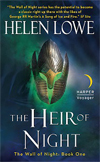
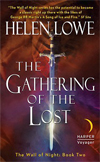






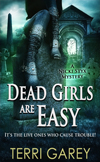

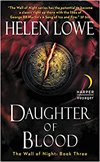
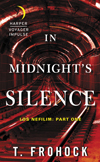

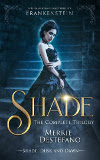

No comments:
Post a Comment